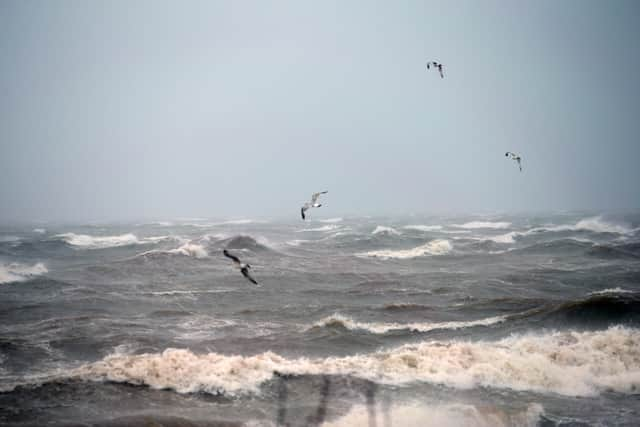Storm Arwen: Emergency advice issued as gusts up to 80MPH could hit Derry and Donegal today
and live on Freeview channel 276
Level 1 & Level 2 Warning of Wind have been issued for the north of Ireland, particularly along the northern coastline communities including County Derry and Inishowen.
These are valid from 2pm today (Friday, November 26) right through until 6pm tomorrow, Saturday.
Advertisement
Hide AdAdvertisement
Hide AdThe NI W&FAS states: “High winds associated with Storm Arwen are expected to impact NI from Friday afternoon, evening, overnight and during Saturday, gradually easing through Saturday.


“Winds will gust widely up to 55-65mph across all parts, with 70-80mph possible within the Level 2 warning area, highest gusts will be around the coasts.
“Heavy showers of Rain, Sleet & Snow may be an additional hazard at times (especially later Friday and into Saturday). Some accumulations of snow may be possible over the hills leading to difficult driving conditions on high level routes.”
People are urged to void coastal areas such as beach & sea fronts, promenades and coastal roads “due to risk to personal safety from large over topping waves”.
Advertisement
Hide AdAdvertisement
Hide AdThe Northern Ireland Executive meanwhile has also issued safety advice in light of the approaching storm: “There is a weather warning for strong winds today and overnight into tomorrow. Travel delays, power cuts, spray and large waves in coastal areas, flooding, and fallen trees are a possibility,” it has stated.
The NI Executive has also shared the following emergency numbers and advice:
Emergency services – 999 or 112
Northern Ireland Electricity Networks – 03457 643 643
NI Gas Emergency Service – 0800 002 001
Northern Ireland Water Waterline – 03457 440 088
Flooding Incident Line – 0300 2000 100
Housing Executive – 03448 920 901
You can report a fallen tree or blocked road at the following link: www.nidirect.gov.uk/services/report-obstruction-road-or-streetIf your power is off and you want to report it or get more information, contact NIE Networks Customer Helpline: 03457 643 643
If the conditions are bad, ask yourself if you can delay your journey until conditions improve.
Advertisement
Hide AdAdvertisement
Hide AdYou’re advised not to visit forests, country parks and nature reserves until the strong winds weather warning is over due to the increased risks of fallen trees, branches and debris.
All road users are asked to pay attention to any road signs and temporary arrangements put in place during severe weather.
Longer journey times or cancellations are possible as road, rail, air and ferry services are affected, with the chance that some roads and bridges could close.
High-sided vehicles are most affected by windy weather, but strong gusts can also blow a car, cyclist, motorcyclist or horse rider off course. This can happen on open stretches of road exposed to strong cross winds, or when passing bridges or gaps in the hedges.
Advertisement
Hide AdAdvertisement
Hide AdIn very windy weather a vehicle may be affected by turbulence created by large vehicles. Motorcyclists are particularly affected, so keep well back from them when they are overtaking a high-sided vehicle.
Motorists are also advised to drive with care due to possible wind-blown debris.
If you’re planning to travel by air or sea, you should check with the ferry company or airline in case there are any delays or cancellations.
keep your property in a well-maintained condition (for example replace/ repair any loose roof tiles, guttering, and so on that could potentially come loose and cause injury or damage to property)
Advertisement
Hide AdAdvertisement
Hide Adsecure loose objects such as ladders, garden furniture, wheelie bins, trampolines, or anything else that could be blown around
close and securely fasten doors and windows
park vehicles in a garage (if you have one) or keep them clear of buildings, trees, walls, and fences make sure you are prepared should there be a power cut
During a storm you should:
stay indoors as much as possible
if you do go out, try not to walk or shelter close to buildings and trees
not go outside to repair damage while the storm is ongoing
not drive unless your journey is really necessary
if you’re a farmer, not enter fields bordered by trees or with powerlines unless absolutely necessary
After a storm you should:
Advertisement
Hide AdAdvertisement
Hide Adbe careful not to touch any electrical/ telephone cables that have been blown down or are still hanging
not walk too close to walls, buildings, and trees as they could have been weakened
Preparing for a power cut
It’s important to be prepared for a potential loss of power. You should:
know where your household fuses and trip switches are so that you can check if the problem is with your electrics only
test smoke alarms regularly
Advertisement
Hide AdAdvertisement
Hide Adkeep a supply of new batteries in torches and radios (for checking updates on news bulletins)
keep a supply of candles
keep mobile phones, laptops or tablets fully charged – so you will have use of battery power for a short time at least
have the telephone numbers you might need to hand (as well as mobile phones, a non-mains powered landline telephone will help you stay in touch during any disruptions to your power supply)
if you have a baby at home, make sure you have a supply of pre-prepared formula baby milk (if used) and prepare a flask of hot water to heat bottles and baby food (it is always safer to make up a fresh feed; when this is not possible, feeds should never be stored for longer than 24 hours)